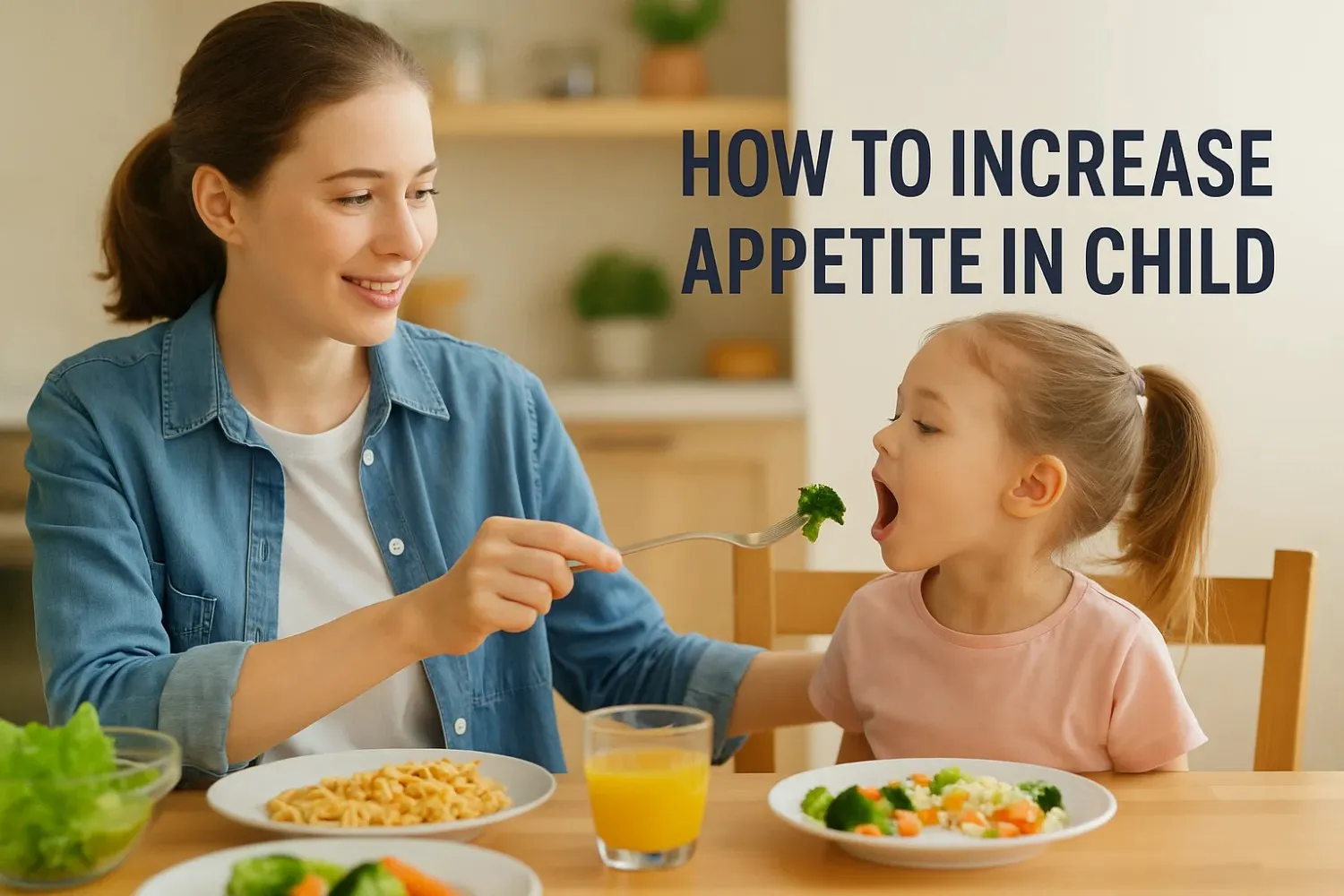Currently Empty: ₹0.00
How To Increase Appetite In Child

Written & Published By: Satya Narayan Pandey
One of the most serious concerns we have as parents is our child’s poor eating habits. Any parent can be concerned when their child suddenly loses their appetite or when they lose it consistently. Children are in different stages of development, and food aversion is typical at times.
However, if your child never exhibits an interest in eating or consumes significantly less than usual, it may be indicative of a deeper issue. Understanding the probable causes and early indications, and making a few home modifications, can help your child’s appetite change more naturally. Here are signs, causes. And tips on how to increase appetite in children.
Signs Of Lack Of Appetite In Child
Eating poorly does not always indicate that a child is merely a picky eater. These are some of the most evident signs of diminished appetite that you can’t afford to ignore.
- Poor Weight Gain
- Stagnant Growth
- Abdominal Pain
- Recurrent Vomiting
- Recurrent Diarrhea
- Constipation
- Nausea
- Vomiting
- Facial Swelling
- Rash
Causes Of Loss Of Appetite In Children
Children’s appetite loss can be caused by a wide range of factors, from nutritional deficits to common illnesses. Knowing about them helps in finding the best answer rather than forcing them to eat.

1. Iron Deficiency Anaemia
A lack of iron in the body interferes with energy levels and overall growth. A kid may become weary, weak, and refuse to eat. In addition to a weak appetite, common symptoms include pale complexion, irritability, and an unwillingness to engage in physical activity.
2. Oral Ulcers / Thrush
If you have oral ulcers or a fungal infection, eating will be painful. Children may reject food because each bite is uncomfortable. This might lead to increased liquid consumption and solid intolerance owing to mouth pain.
3. Systemic Illness
Dengue, viral fever, and renal problems are all conditions that can significantly reduce appetite. Children may feel poorly during the illness or even after a few days of recovery, become lethargic, and reject entirely solid foods.
4. Developmental / Teething Milestones
Children get restless and fussy during a growth spurt or while teething. They lose interest in food due to swollen or general gum swelling. Their appetite usually returns when the milestone stage slows.
5. GI Illness
Stomach infections can cause symptoms such as nausea and pain, worms or other stomach issues, diarrhoea, or even chronic vomiting. Because of the continual ache in their stomachs, children stop eating.
6. Overeating
Children may indulge in junk food, sweets, or even excessive amounts of milk shortly before meals. Constant eating satisfies them while also eliminating bodily hunger at mealtimes.
7. Antibiotic Misuse
Antibiotics, when used repeatedly or unnecessarily, can disturb gut microorganisms. This typically results in inefficient digestion, stomach irritation, or loss of appetite.
Tips To Increase Appetite In Child
There is no magic pill, but you may gradually improve your child’s hunger signals by making minor lifestyle changes and practising routine eating habits. The goal is to build appropriate eating habits in a non-compliant manner.

1. Feed Favourite Foods
Make it simple: start with what your child already enjoys. You can also serve in smaller servings. By consuming a bit more of their favourite food, they enhance their appetite and create a positive construct around the concept of a meal.
2. Set Regular Times to Eat
Establish meal and snack times. When the body is used to eating at the same time every day, it generates hunger. Ask them not to eat randomly throughout the day.
3. Don’t Offer Them Alternative Options
If your child doesn’t want what you make, avoid introducing fast foods like biscuits or noodles. When they see no other option, they will proceed gently and gradually.
4. Increase Physical Activity
Make your child play outside or engage in physical activity. Exercise, sports, gaming, and other activities can all help boost metabolism and increase food intake.
5. Have Meals at the Dinner Table
Dining as a family at the dining table without technology allows children to focus on their meals. Eating habits are also fostered inside the family, and children emulate the practice.
6. Keep Distractions Away
Turn off the television, hide your phones, and do not leave toys on the table. When youngsters are not looking at devices or holding toys, they can eat properly.
When To Call The Paediatrician?

If your child has not eaten properly in more than two weeks and is losing weight, along with additional symptoms such as exhaustion, frequent vomiting, inability to stop diarrhoea, severe constipation, or a skin rash, you should see your physician. Other physical symptoms, such as a sudden, severe drop in food consumption, should be addressed by a doctor. It is usually preferable to find out early on rather than after everything has deteriorated.
Takeaway
Loss of appetite can contribute to weight loss, but it should not be ignored if the consequences persist. Concentrate on food repetition, physical activity, and sharing favourite family recipes. Treat any underlying health issues that may exist. Most children regain their appetite after being patient and consistent.
FAQs: How To Increase Appetite In Child
Q1: How Can I Increase My Child’s Appetite?
Ans: Provide nutrient-dense preferred foods, regular mealtimes, fewer snacks, and more exercise to stimulate natural appetite.
Q2: Which Medicine Is Best For a Child’s Appetite?
Ans: Appetite stimulants should only be prescribed with a doctor’s approval. Syrups or tablets are to be administered without consultation, particularly to young children.
Q3: How Can I Make My Child Eat More?
Ans: Do not force-feed; instead, serve appetising little meals, dine as a family, and maintain a relaxed eating environment.
Q4: How To Help A Child Who Is Not Eating?
Ans: First, discard the medical factors. Then, stimulate hunger by organising meal times, restricting between-meal snacks, and allowing for leisure and stress-free eating.







